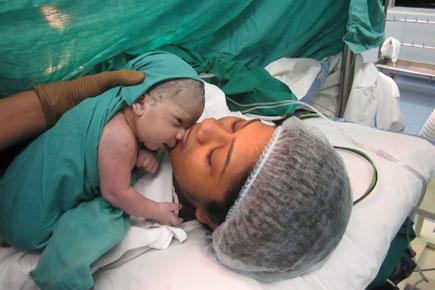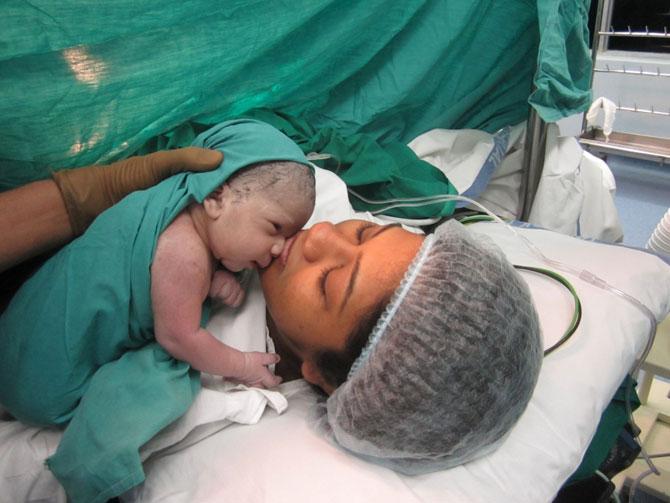Harsha Chavda, India's first test tube baby, delivered a healthy baby. Co-incidentally, the team that performed the delivery of the baby is the same team that delivered her mother Harsha back in 1986

The same team, headed by Dr Indira Hinduja, which delivered the first test tube baby in 1986, delivered her new born 30 years later on Monday.
ADVERTISEMENT

Harsha Chavda with her baby
Mumbai-based gynecologist/obstetrician is best known for her pioneering work in bringing India's first test tube baby into the world in 1986. Baby, Harsha Chavda, is now 30, married to Divyapal Shah and works as a Mumbai-based accountant.
On Monday, Dr Indira Hinduja delivered Harsha's baby —the healthy newborn, conceived naturally, weighed 3.18 kilos. "Both mother and baby are doing great," said a jubilant Dr Hinduja.
Co-incidentally, the team that performed the C-Section on Harsha and delivered the baby today is the same team that delivered her mother Harsha back in 1986.
Dr Kusum Zaveri, who is a part of both teams, said, "Harsha has been in touch with us all her life. We meet and interact with her on a regular basis. It is but natural that she chose us to help deliver her baby."
"It is hard to believe that we have delivered more than 15,000 test tube babies since that day when we first delivered Harsha," said Dr Hinduja. "I still remember the day she was born—it was August 6, 1986, at 4.10 pm, at KEM Hospital. Her parents were on top of the world and so were we," she fondly recalled.
"The Test Tube baby technique though in practice in the western world was not established in India until we found success in 1986 with Harsha's birth. We had to take so many permissions—from the Ethics committee of KEM Hospital, the ICMR, etc," said Dr Hinduja.
"Harsha's mother, Maniben, had suffered from tuberculosis, which had permanently damaged her fallopian tubes. She was desperate to have a baby, and when we explained the new technique to her, she agreed to it immediately," recalled Dr Hinduja. "We did the procedure and spent the next few days praying that it would be successful," recalled Dr Zaveri.
"Coincidentally, Maniben's pregnancy test came positive on my birthday. There was an international conference going on at KEM—a senior doctor interrupted it to announce the big news of the pregnancy," laughed Dr Hinduja.
"And when the delivery finally happened, there was media frenzy. Everyone rushed to KEM Hospital to congratulate us," she adds.
Harsha's pregnancy, on the other hand, was smooth and uneventful. "There is no reason why test tube babies cannot conceive normally. In Harsha's case, we had to do a C-Section because it indicated a breach presentation," explained Dr Hinduja.
Over the years, not surprisingly, the doctor-patient have developed a close bond and have been present in each other's lives ticking off landmark events, whether it is Harsha's wedding a year ago to businessman Divyapal Shah or her pregnancy.
"Harsha will always be special to us," said the doctor.
 Subscribe today by clicking the link and stay updated with the latest news!" Click here!
Subscribe today by clicking the link and stay updated with the latest news!" Click here!







